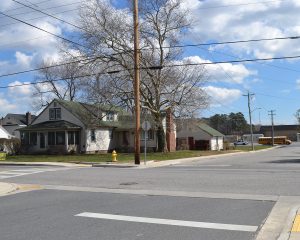
BERLIN – Town officials urged proponents for a recovery house in Berlin to talk with the property’s neighbors before proceeding.
On Monday, members of Hope4Recovery shared their plans for a recovery house in Berlin with members of the town council. The group, which has applied for nonprofit status, hopes to turn a home on William Street into a sober living facility. Officials encouraged members of the group to talk with the property’s neighbors before they moved forward.
“I wouldn’t leave the residents to being the last folks you interact with,” Mayor Gee Williams said. “Getting off to the right start is so important.”
Tish Ottey, an Ocean Pines Police detective, introduced the council to members of Hope4Recovery, an organization she created to establish recovery houses in Worcester County. Ottey told the council that last year, she’d opened the Douglas K. Hamilton House for Recovery in Salisbury and that she hoped Hope4Recovery could establish a similar facility in Berlin. She said overdoses had increased 400 percent between 2014 and 2017 and that in Worcester County, the bulk of the overdoses occurred in the northern section of the county.
Ottey said that the Salisbury facility had housed 50 residents since April of 2017. The average stay at the house was three months. Residents, all men, are required to be drug free and find jobs within two weeks of moving in. They help maintain the home while they live there. They’re also expected to attend counseling and support sessions. A live-in house manager oversees the facility.
“My vision in opening this home was to make it a home, not someplace with used furniture and broken-down appliances,” she said.
Theo Williams, housing and homelessness manager in Salisbury, said he’d only had one complaint from neighbors of the Douglas K. Hamilton House and it had related to a beep from a taxi. He said residents of the neighborhood had been concerned when they first learned a recovery house was being established.
“There was a lot of fear,” he said.
Ottey’s communication with citizens, and her efforts to improve the home, however, served to reassure residents.
“She took a dilapidated house, invested money, heart and soul and really was able to transform this into a pillar of the community,” he said.
Williams said he was also a member of an opioid intervention task force and was aware of the lack of recovery facilities on the Eastern Shore.
“It’s a crisis that’s not going to be going away,” he said. “If anything, it might even be getting worse … Do not expect this to be fixed by ignoring it.”
Ocean City native Bryan Zimmerman told the council he was a current resident of the Douglas K. Hamilton House. He said that during his stay there he’d learned accountability and responsibility.
“With more homes like Hamilton in place those who want to make a change can survive and thrive,” he said.
Councilman Thom Gulyas asked whether the Worcester County Board of Education had weighed in on the proposed recovery house, as the facility would be located close to Berlin Intermediate School.
Ottey said she’d spoken with Superintendent Lou Taylor and Chief Operating Officer Steve Price. They asked her to make a presentation to the school board March 20.
Councilman Elroy Brittingham said parking should be a consideration at the recovery house, as school buses traveled the adjacent side street.
Ottey said a shed on the property was being removed and would provide it with more on-site parking space.
Williams said the town’s board of appeals would have to consider the project before it could move forward.
“Because of the unique nature of the service, they are the decision making body,” he said.
He encouraged Ottey to get a letter of recommendation from the school board before meeting with Berlin’s board of appeals.
When asked if neighbors of the property had been notified of Hope4Recovery’s plans, Ottey said they had not.
“That to me is really the first thing that’s been said that’s an unfortunate oversight,” Williams said. “Obviously, we want to take into consideration the people that live here.”
He said reaching out to the neighbors would show good faith, which was important if the organization wanted to get off to a good start in Berlin.
“You’re setting a precedent not just for Berlin but for other small communities,” he said.
Councilman Troy Purnell said Ottey and her associates should speak with residents. He said he supported the concept but wanted to know what citizens thought.
“I’d suggest you do your homework as soon as possible,” Purnell said.
Councilman Zack Tyndall also praised the concept of the recovery house but said officials needed to know what residents thought about the potential recovery house.
“I’d really like to hear from the constituent base as well,” he said.
Hope4Recovery also asked the council to consider waiving the $325 fee associated with the board of appeals hearing. Officials said they’d consider a refund request once Hope4Recovery was officially a nonprofit.

